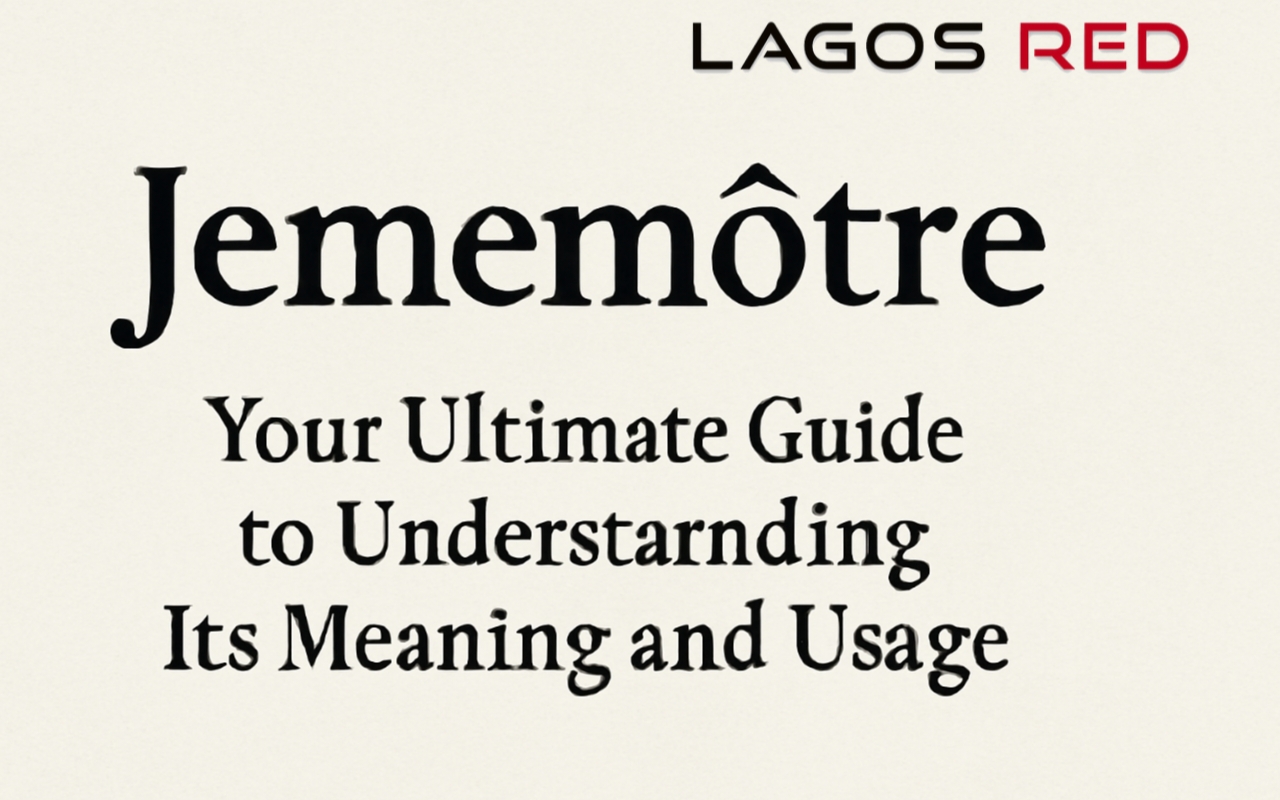Introduction
In a world that increasingly values individuality, self-awareness, and personal growth, there emerges a concept that encourages deep introspection and authenticity: jememôtre. This unique term, while not found in traditional dictionaries, has captured the attention of those seeking to define their own personal journeys and self-reflection processes.
As people continue to evolve and discover their own identities, jememôtre has become a key concept for those who prioritize internal validation over external expectations. This article offers a comprehensive exploration of jememôtre, providing a deep dive into its meaning, origins, cultural significance, practical applications, and its broader psychological, philosophical, and artistic impacts.
What Is Jememôtre?
The word jememôtre is a combination of two distinct French phrases: “je me” (which translates to “I myself”) and “môtre,” which is derived from words like “nôtre” (ours) or “mètre” (measure). While this word may seem like a linguistic novelty, it represents a much deeper concept—one that revolves around personal self-assessment, reflection, and growth. Jememôtre can be interpreted as the act of measuring or assessing one’s own growth, understanding, and development.
It is a term that emphasizes an individual’s power and responsibility to define their own identity and track their personal journey. Rather than relying on traditional societal metrics of success—such as wealth, status, or fame—jememôtre empowers individuals to measure their progress based on internal values, goals, and self-awareness.
The growing popularity of jememôtre can be attributed to the increasing number of individuals seeking a deeper understanding of themselves and how they fit into the world around them. In an age dominated by social media, materialism, and external validation, jememôtre offers an antidote—a personal tool for measuring one’s internal growth, resilience, and emotional well-being.
The Linguistic Roots and Evolution of Jememôtre
The word jememôtre finds its roots in the French language, combining “je me,” a phrase that emphasizes the individual’s agency, with “môtre,” which evokes a sense of measurement or belonging. This combination is not merely a linguistic construction; it holds profound significance in how we view the process of self-awareness and personal development.
The phrase “je me” indicates a focus on the self, underscoring the agency an individual has in shaping their life. On the other hand, “môtre” introduces the concept of measurement—something tangible that allows individuals to track their growth, challenges, and milestones.
In traditional culture, measuring one’s success was often confined to external markers such as financial wealth, educational achievement, and social standing. However, jememôtre redefines this idea by shifting the focus from these external validations to internal reflection and self-assessment. It encourages individuals to define their own success, find meaning in their experiences, and measure their growth based on their own values.
As the world continues to evolve, the importance of self-awareness and emotional intelligence becomes clearer. Jememôtre represents a personal philosophy that challenges the societal norm of external measurement and offers a new paradigm where personal development, introspection, and authenticity take center stage. While the term may not have appeared in formal language until recently, its growth reflects a broader cultural shift towards valuing mental health, self-empowerment, and emotional intelligence.
Cultural Significance and Symbolism
The concept of jememôtre holds deep cultural significance, especially in a time when individuals are increasingly aware of their personal narratives and the importance of authenticity. In many societies, there is often pressure to conform to external expectations—whether in terms of appearance, lifestyle, career, or relationships. Jememôtre serves as a counterbalance to these pressures, encouraging people to engage in internal reflection and define their identity on their own terms.
At its core, jememôtre challenges the conventional idea of success by promoting a more holistic approach to life. Instead of measuring oneself against traditional standards such as wealth or career status, jememôtre encourages individuals to assess their emotional well-being, personal growth, relationships, and contributions to society. By focusing on internal markers of success, jememôtre fosters a sense of self-empowerment that prioritizes personal fulfillment and mental health over societal validation.
Jememôtre also plays a significant role in the broader movement of self-awareness and mindfulness that has gained traction in recent years. It is closely aligned with concepts like mindfulness meditation, which encourages individuals to be present with their thoughts and feelings. By adopting jememôtre, individuals are not only practicing self-reflection but are also building a deeper connection with themselves, leading to greater emotional resilience and a more balanced life.
Furthermore, jememôtre holds particular relevance in the age of social media, where people are often driven to seek external validation through likes, comments, and followers. In this context, jememôtre encourages individuals to take a step back and consider their personal growth, regardless of the external recognition they may or may not receive. It is a call to focus on internal worth and authenticity, allowing people to break free from the cycles of comparison and competition that dominate online platforms.
Applications of Jememôtre in Daily Life
Personal Reflection and Journaling
One of the most accessible and impactful ways to integrate jememôtre into daily life is through journaling. Personal reflection through writing provides individuals with a structured way to track their thoughts, emotions, and progress. Whether through a daily or weekly journaling practice, jememôtre encourages individuals to take a moment to reflect on their journey, assess their growth, and set intentions for the future. Journaling not only offers a space for emotional expression but also serves as a tool for deeper self-awareness, allowing individuals to confront challenges, recognize achievements, and align their actions with their values.
A key aspect of this practice is the idea of self-measurement. By consistently journaling, individuals can create a tangible record of their emotional and personal growth. This provides them with valuable insights into how they have evolved over time and offers a sense of accomplishment as they witness their journey unfold.
Creative Expression
In addition to journaling, jememôtre has found a place in creative expression. Artists, writers, and musicians often use self-reflection as a central theme in their work. Whether through poetry, visual art, or music, creative expression allows individuals to channel their inner thoughts and emotions into something tangible. By exploring the concept of jememôtre through their art, creators not only engage in personal reflection but also offer others an opportunity to engage with the idea of self-awareness and growth.
For example, a writer might explore their personal journey of self-discovery by creating a fictional character who embarks on a quest of introspection and transformation. Similarly, a painter might use abstract imagery to depict the various phases of self-measurement, from doubt and confusion to clarity and enlightenment. These creative works serve as an invitation for others to reflect on their own journeys and consider the role of jememôtre in their lives.
Digital Platforms and Social Media
In the digital age, jememôtre has found a place on social media, where people often share their personal reflections, achievements, and challenges. Hashtags such as #jememôtre allow individuals to connect with like-minded people who are on a similar journey of self-discovery and growth. These online communities provide a space for people to share their experiences, celebrate milestones, and offer support to others who are engaging in the process of self-reflection.
Social media platforms also allow for the creation of content that encourages introspection and self-assessment. Influencers, content creators, and wellness advocates use their platforms to promote the practice of jememôtre, offering their followers guidance on how to engage in personal reflection, set meaningful goals, and prioritize mental well-being. In this way, jememôtre has become a form of digital activism that challenges the norms of superficiality and encourages deeper, more meaningful engagement with the self.
Psychological and Philosophical Perspectives
Psychological Insights
From a psychological perspective, jememôtre aligns with the principles of mindfulness and metacognition. Mindfulness encourages individuals to be fully present in the moment, paying attention to their thoughts, emotions, and physical sensations. Similarly, metacognition involves reflecting on one’s thinking processes and gaining insight into how one approaches challenges and decision-making. Jememôtre takes these concepts a step further by encouraging individuals to actively measure their emotional and psychological growth, creating a feedback loop that fosters self-awareness and emotional regulation.
Regular practice of jememôtre can have therapeutic benefits, as it allows individuals to identify patterns in their behavior and thought processes that may contribute to stress, anxiety, or depression. By engaging in self-reflection, individuals can better understand their triggers, cope with negative emotions, and make more intentional choices in their daily lives. This process of self-assessment helps people develop healthier coping strategies, build resilience, and improve their overall mental health.
Philosophical Dimensions
Jememôtre is also rooted in philosophical concepts of authenticity and existentialism. Philosophers such as Jean-Paul Sartre and Søren Kierkegaard emphasized the importance of living authentically and defining one’s own existence in a world filled with societal pressures and expectations. Jememôtre embodies these ideas by encouraging individuals to take ownership of their lives and define their identity based on personal values rather than external standards.
At its core, jememôtre invites individuals to engage in an ongoing process of self-exploration, where they are free to define success, happiness, and fulfillment on their own terms. In this sense, jememôtre aligns with the existential idea of embracing personal responsibility and finding meaning in one’s own existence, regardless of external influences.
Conclusion
Jememôtre is more than just a term—it is a powerful practice that encourages individuals to engage in deep self-reflection and personal growth. By shifting the focus from external validation to internal self-assessment, jememôtre offers a framework for individuals to define their own identities, track their progress, and prioritize their emotional well-being. As the world continues to evolve, jememôtre stands as a beacon of authenticity, offering a reminder that true growth begins from within.


